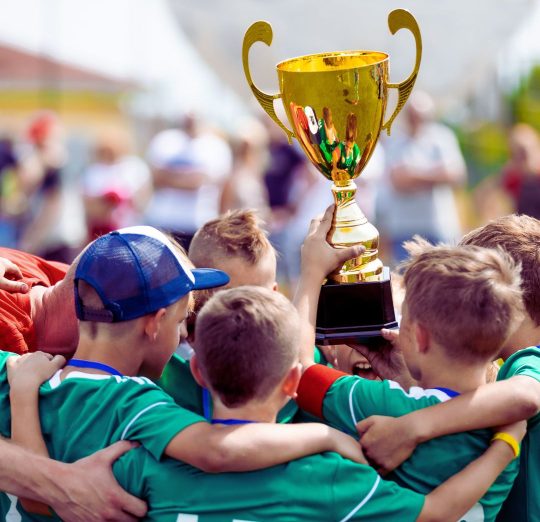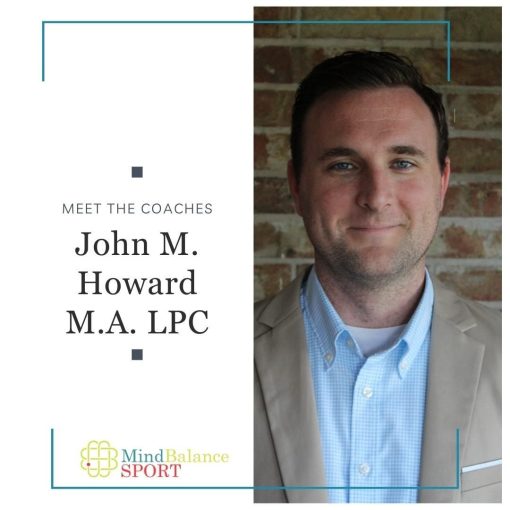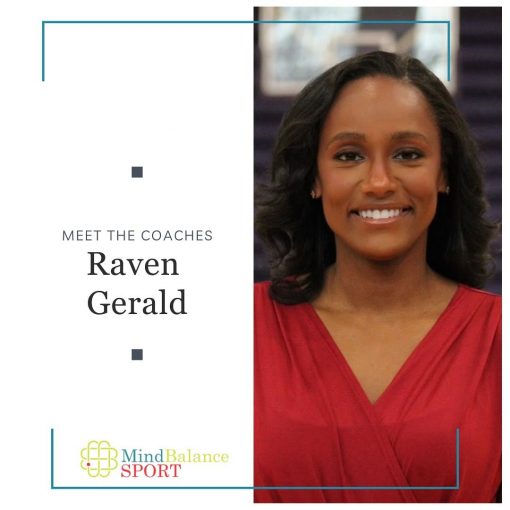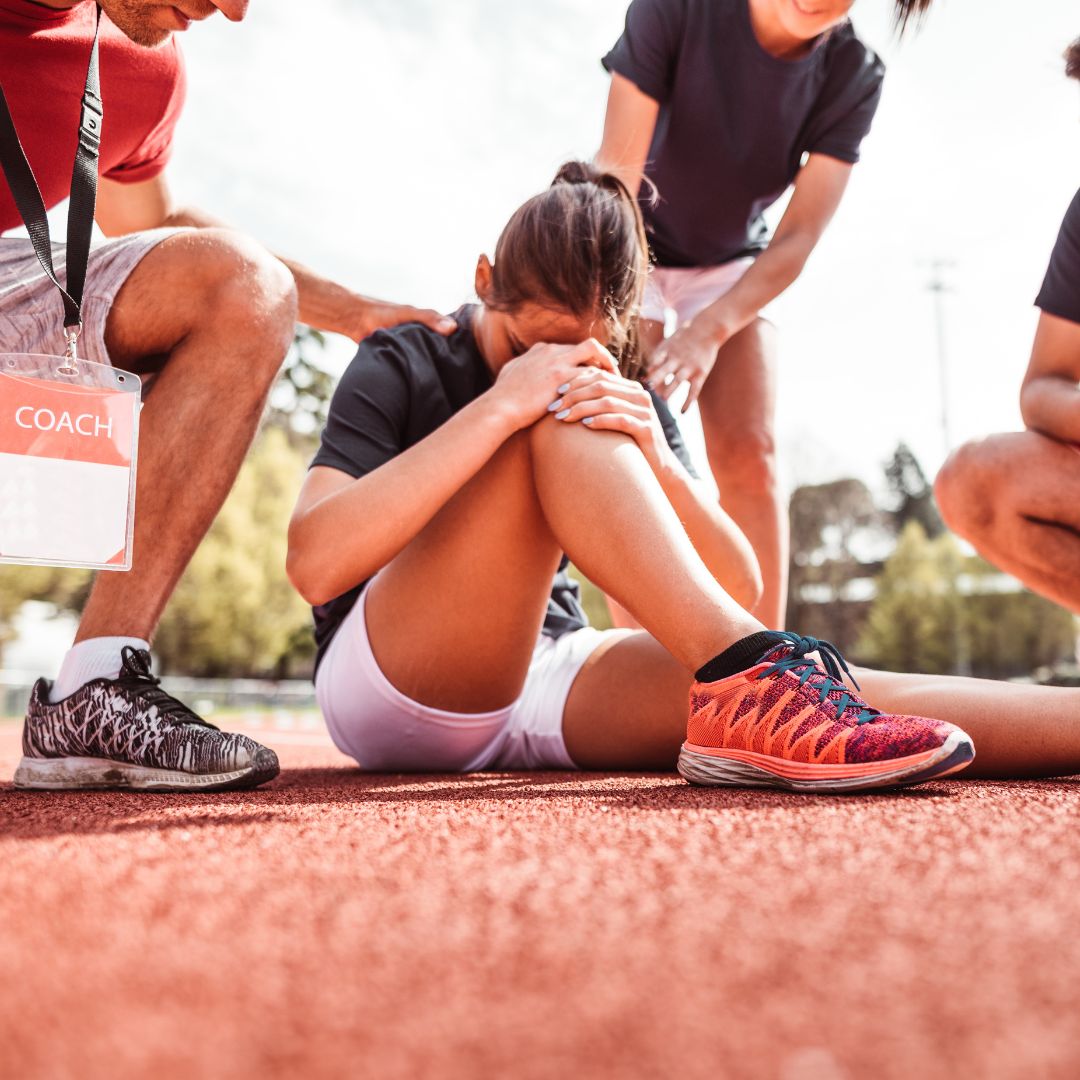Sports Psychologist in Chantilly, VA
You want to work on your mental game, but how do you train your brain?
At MindBalanceSPORT, We Train The Other Half Of The Athlete.
You want to work on your mental game, but how do you train your brain?
Mental training does not get much media attention, but at MindBalanceSPORT we know it is a game changer. The mental skills you will learn at MindBalanceSPORT are generalizable in the classroom, in sport and in life!
We know that mental skills can be successfully taught, even at an early age.

Our Services
Meet the Team





testimonials
Athlete Stories: Real Comebacks, Real Results

Emma, a high school basketball player, tore her ACL in the middle of her junior season. After surgery, she struggled with self-doubt and fear every time she stepped back on the court. Through sport psychology training, she learned visualization techniques and confidence-building exercises that helped her regain trust in her knee. When she returned for her senior season, she didn’t just play—she led her team to the playoffs.

Carlos, a soccer player, suffered a stress fracture in his foot and had to miss half of his season. Sitting out was mentally tougher than the pain itself. We worked on mental engagement strategies to keep him sharp—studying game film, setting small rehab goals, and using mental imagery to stay ready. When he was finally cleared, his confidence never wavered.

Jordan, a track athlete, strained her hamstring before a major competition. She feared losing speed and falling behind competitors. Instead of focusing on what she couldn’t do, we redirected her energy toward mental preparation, using self-talk and goal setting to keep her confidence strong. When she returned, she set a new personal record.
EXCELLENTTrustindex verifies that the original source of the review is Google. It was a great help to my 14-year-old competitive volleyball player daughter. Raven was great to understand and connect with her from start to end. We will continue with our sessions as needed.Trustindex verifies that the original source of the review is Google. Great results! I’ve loved working with Paula. Our sessions have greatly improved both the physical and mental aspects of my tennis game. I’m playing better and having more fun! Highly recommend!Trustindex verifies that the original source of the review is Google. Our family had a wonderful experience with Paula Castro. We needed some additional confidence in a particular area/sport and Paula helped get us there. We know who to turn to if we need help again. She’s been a Blessing. Thank you, Paula!Trustindex verifies that the original source of the review is Google. I highly recommend MindBalanceSPORT. Our son works with John Howard. John is very caring, positive, and effective at working with teenagers. John is an adept listener and created an individualized plan tailored to our son’s personality. After just a few sessions with John, we noticed a significant improvement in our son’s motivation and mental approach to sports and life in general. Our son looks forward to meeting with John and tells us that he benefits immensely from their connection.Trustindex verifies that the original source of the review is Google. Paula Castro is an outstanding professional on the field. She has helped my daughter improve her confidence, preparation, and thanks to these session she feels more prepared and motivated. Paula takes the time also to share (what she can) and align with us as parents to be on the same page. Strongly recommended!Trustindex verifies that the original source of the review is Google. MineBalanceSPORT has quickly become the area's expert in sports psychology. Their reputation is well deserved given their incredibly thoughtful, scientifically based approaches to treating performance-related conditions, and I have only heard glowing, positive feedback from those who have engaged in their program. I will also add that Drs. Jones and Chirby presented to us (our group comprises of 15+ doctors and masters level clinicans) about their program and impressed us all with their level of expertise and passion for this field. I give them my highest recommendation.Trustindex verifies that the original source of the review is Google. Dr. Jones was beyond helpful to me throughout our time together. If you are an athlete and you need advice or assistance this is the place to come to. She completely changed my outlook and mindset in a time when I needed her most. I look forward to staying in touch with her and am forever thankful for her expertise.Trustindex verifies that the original source of the review is Google. Paula has been a huge help with my daughter Morgan coming off her injury. It’s been 18 months since she’s played basketball and she’s thriving because I know Paula is guiding her the right direction. As a mother, I’m extremely gratefulTrustindex verifies that the original source of the review is Google. If you are looking for Amazing Psychologists who can help support you in your sports performance, you need to call MindBalanceSPORT! Dr. Chirby and her colleagues are a wealth of knowledge, they have so many helpful techniques for mind balance, and they have so much compassion for the communities that they serve! Highly recommend!!!
Recovery
While Everyone Has A Physical Ceiling, There Is No Mental Ceiling.
Exploring Performance Psychology in Chantilly, VA: How Coaches Support Elite Athletes' Pre-Performance Routines
Exploring Performance Psychology in Chantilly, VA: How Coaches Support Elite Athletes’ Pre-Performance Routines
Coaches play a pivotal role in preparing elite athletes for peak performance, and one of their critical responsibilities is to support and refine pre-performance routines. These routines, often tailored to an athlete’s unique needs, act as a psychological primer that boosts focus, reduces anxiety, and fosters consistency. Understanding how to structure and reinforce these routines is essential for building a foundation for success.
Why Pre-Performance Routines Matter
Pre-performance routines are not merely superstitions or habits; they serve several key functions: – Consistency: Helps athletes maintain a stable mental state regardless of external pressures. – Focus: Directs attention toward controllable actions rather than distractions. – Stress Reduction: Diminishes anxiety by creating predictability in uncertain environments. – Confidence Building: Reinforces positive self-belief through familiar actions.
By supporting these routines, coaches can positively influence an athlete’s mindset before they step onto the field, court, or track.
Key Elements of Effective Pre-Performance Routines
- Warm-ups designed to optimize physical readiness.
- Stretching or light cardio exercises that align with the athlete’s specific sport requirements.
- Use of visualization techniques, where athletes mentally rehearse successful performances.
- Encouraging mindfulness exercises such as controlled breathing.
- Practicing specific skills or drills that mimic competition scenarios.
- Reviewing game plans and strategies with calm precision.
- Coaches can help athletes identify triggers for nervousness and implement strategies like progressive muscle relaxation or grounding techniques.
How Coaches Can Support Athletes
- Individualized Approach: Each athlete has unique needs and preferences; therefore, coaches should work collaboratively with athletes to develop personalized routines.
- Reinforcement Through Repetition: Encourage consistent practice of pre-performance routines during training sessions so they become second nature during competition.
- Observing & Adjusting: Monitor how well each routine serves its purpose and adjust based on feedback from the athlete or changes in competition demands.
- Positive Communication: Offer constructive guidance while ensuring affirmations that boost confidence levels without instilling doubt.
- Modeling Behavior: Demonstrating calmness under pressure sets an example for athletes to emulate within their own preparation process.
| Element | Examples | Purpose |
| Physical Preparation | Stretching, light cardio | Activates muscles; prevents injury |
| Mental Focus | Visualization, mindfulness exercises | Sharpens concentration |
| Task-Oriented Actions | Skill-specific drills | Builds familiarity with execution |
| Emotional Regulation | Breathing techniques; mental reframing | Reduces anxiety |
Benefits of Coach-Supported Routines
When coaches actively support pre-performance routines: – Athletes experience heightened self-assurance. – Teams demonstrate greater cohesion due to uniform preparation processes. – Performance variability is minimized even under high-pressure scenarios.
Strategies for Sport Performance Training in Chantilly, VA to Support International Athletes’ Adaptation
International athletes often face unique challenges when transitioning to new environments. These challenges range from cultural differences and language barriers to social isolation and unfamiliar training conditions. Coaches and support staff play a pivotal role in ensuring these athletes adapt effectively, both on and off the field. Employing proactive strategies can help international athletes thrive in their new settings.
Key Challenges Faced by International Athletes
- Cultural Adjustment: Adapting to different customs, traditions, and norms.
- Language Barriers: Difficulty in communicating with teammates, coaches, or support staff.
- Homesickness: Missing family, friends, and familiar surroundings.
- Dietary Differences: Adjusting to new cuisines or lack of access to preferred dietary options.
- Training Environment: Changes in climate, facilities, or methodologies that may require physical and mental adjustment.
Being proactive in addressing these challenges is critical for ensuring optimal performance.
Organizational Strategies for Supporting Adaptation
- Offer workshops or sessions on local culture, customs, and communication styles.
- Provide resources such as language training or translators when necessary.
- Assign team members (e.g., player liaisons) who help with integration into the team environment.
- Designate support staff for personal matters such as housing assistance or visa issues.
- Pair new international athletes with experienced team members who can provide guidance during the adaptation phase.
- Encourage regular check-ins between mentors and mentees for timely support.
- Allow time for rest after long travel schedules.
- Gradually integrate the athlete into high-intensity training schedules while monitoring physical adaptation.
- Ensure availability of sports psychologists who specialize in cultural adjustment.
- Conduct periodic assessments of mental health during transitional periods.
Role of Coaches in Supporting Adaptation
- Create a welcoming team culture that celebrates diversity.
- Foster open communication channels where athletes feel safe sharing concerns.
- Tailor training sessions to account for individual needs stemming from environmental changes (e.g., altitude adaption).
- Set realistic performance expectations that acknowledge time needed for adjustment.
| Strategy | Purpose | Example |
| Cultural Orientation | Help athletes understand local norms | Organize cultural sensitivity workshops or city tours |
| Peer Mentorship Systems | Build trust through shared experience | Pair athlete with senior teammates fluent in their native language |
| Flexible Scheduling | Allow gradual acclimatization | Reduce workload during initial weeks |
| Psychological Resources | Address mental health needs | Provide online counseling sessions |
Tailored efforts towards adaptation not only improve athletic performance but also foster long-term trust between organizations and their international talent pools. Structured support systems demonstrate an organization’s commitment to inclusivity while allowing all individuals within a team—regardless of origin—to reach their fullest potential.
Building Team Culture with a Sports Mental Coach in Chantilly, VA to Boost Performance and Unity
Creating a strong and effective team culture is essential for enhancing both individual and collective performance in sports. It fosters a sense of shared purpose, trust, and unity among team members, which are critical elements for success. Building such a culture requires deliberate effort from coaches, athletes, and support staff.
Key Components of an Effective Team Culture
- Shared Vision and Goals:
Clearly defined objectives help athletes understand their role within the broader team context. A shared vision ensures alignment between individual aspirations and team priorities. - Mutual Respect:
Cultivating respect among teammates creates a positive environment where contributions are valued. When athletes feel respected, it enhances collaboration. - Open Communication:
Transparent communication helps prevent misunderstandings and ensures that everyone is on the same page. Regular team meetings can provide a platform to address issues proactively. - Accountability:
Accountability ensures that all members take ownership of their actions. This includes both celebrating successes as a team and addressing challenges collectively. - Leadership at All Levels:
While coaches play a pivotal role in shaping culture, fostering leadership qualities among athletes strengthens the group’s cohesion. Team leaders should model commitment, resilience, and positivity.
Strategies to Develop Team Culture
- Define Core Values: Begin by identifying values that represent the team’s identity (e.g., discipline, integrity, perseverance). These values should guide decision-making within the group.
- Encourage Collaboration Through Team-Building Activities: Activities like problem-solving exercises or group challenges outside of competition can strengthen bonds between teammates.
- Integrate Feedback Mechanisms: Providing opportunities for peer-to-peer or coach-to-athlete feedback allows continuous improvement while fostering trust.
Practical Initiatives to Enhance Unity
| Initiative | Description |
| Preseason Retreats | Organizing retreats with workshops focused on teamwork can set the tone for the season. |
| Recognition Programs | Highlighting individual contributions regularly reinforces collective efforts toward goals. |
| Mentorship Pairing | Pairing senior athletes with newer members helps bridge experience gaps while building camaraderie. |
Challenges in Building Team Culture
- Diverse backgrounds among players may lead to differences in expectations or communication styles.
- Poor conflict resolution practices can erode trust over time.
- External pressures such as media scrutiny or organizational politics may disrupt focus on collective goals.
Coaches must address these challenges strategically by providing clear direction, maintaining consistency in behavior and decisions, and remaining adaptable to their team’s evolving needs.
By leveraging intentional strategies to create an effective team culture grounded in trust and shared purpose, teams are better positioned to achieve sustainable success both on and off the field. This approach not only improves athletic performance but also contributes significantly to the personal growth of every athlete involved.
Enhancing Sports Performance Through Sports Psychiatry in Chantilly, VA
Anxiety is a common challenge for athletes at all levels, especially when faced with high-pressure competitive environments. Sports psychologists and coaches play a crucial role in helping athletes manage this anxiety through tailored mental strategies and preparation techniques. Below are effective methods that can help reduce anxiety and enhance performance.
Understanding Competitive Anxiety
Competitive anxiety can manifest in two primary forms: – State Anxiety: A temporary emotional response specific to certain situations (e.g., a championship game). – Trait Anxiety: A general tendency to perceive various situations as threatening, leading to chronic stress.
Symptoms may include increased heart rate, difficulty concentrating, muscle tension, or negative self-talk. Recognizing these signs early allows for the implementation of targeted mental strategies.
Key Mental Strategies to Reduce Anxiety
- Controlled breathing promotes relaxation and reduces physiological stress responses.
- Techniques such as diaphragmatic breathing or box breathing (inhale for 4 seconds, hold for 4 seconds, exhale for 4 seconds) can be incorporated into pre-performance routines.
- Encourage athletes to visualize themselves succeeding in their sport.
- Focus on creating vivid mental images of desired outcomes (e.g., scoring a goal) while engaging all senses to enhance realism.
- Regular practice of imagery strengthens confidence and reduces pre-competition nerves.
- Replace negative internal dialogue with affirming statements like “I am prepared” or “I’ve trained hard for this moment.”
- Create personalized mantras or phrases that resonate with the athlete during competition.
- Encourage mindfulness practices like meditation or grounding exercises to keep athletes focused on the present moment.
- These techniques prevent overthinking past errors or worrying about future outcomes.
- Establish consistent routines that include physical warm-ups, mental preparation activities, and rituals specific to the athlete’s preferences.
- Predictable routines provide a sense of control, reducing feelings of uncertainty that contribute to anxiety.
| Strategy | Benefits |
| Breathing Techniques | Reduces physical symptoms of stress |
| Visualization & Imagery | Builds confidence and focus |
| Positive Self-Talk | Enhances motivation and self-belief |
| Mindfulness Training | Improves concentration under pressure |
| Pre-Competition Routines | Creates stability in high-stress moments |
Preparation Techniques for Coaches
Coaches are instrumental in reducing athlete anxiety by fostering an environment that prioritizes mental skills development alongside physical training. Consider these approaches: – Open Communication: Regularly check in with athletes about their emotional state before competitions. – Scenario-Based Practice: Simulate high-pressure situations during training sessions so athletes feel more prepared when experiencing them in real events. – Encouragement Over Criticism: Frame feedback constructively; emphasize strengths while addressing areas for improvement.
Implementing these strategies lets coaches empower their athletes to manage competitive anxiety effectively while maintaining focus on peak performance goals.
Transform Your Team with the Help of Sports Psychologists in Chantilly, VA
Creating a high-performing team is one of the most demanding yet rewarding challenges for coaches. Transforming a group of individuals into a cohesive, goal-oriented unit requires careful planning, patience, and intentionality. Coaches play a pivotal role in fostering collaboration, shared vision, and accountability among their athletes. Below is an exploration of key strategies to help coaches turn groups into well-functioning teams.
Find Clarity and Purpose with a Sports Psychologist Near Me
A shared purpose aligns individual efforts toward collective goals. Coaches must: – Define the team’s mission and objectives. – Communicate this vision consistently in meetings, training sessions, and competition settings. – Encourage buy-in by involving athletes in creating team goals.
When athletes understand how their roles contribute to the bigger picture, they are more likely to commit to the team’s success.
2. Foster Open Communication
Open communication is essential for building trust and addressing challenges effectively. To promote transparent communication: – Create an environment where athletes feel heard without fear of judgment or criticism. – Use team meetings as opportunities to discuss feedback and address conflicts constructively. – Implement regular check-ins with individual athletes to assess their personal concerns or progress.
Encouraging dialogue strengthens relationships within the group and improves cohesion.
3. Build Trust Among Team Members
Trust forms the foundation of any successful team dynamic. Coaches can nurture trust by: – Modeling honesty, reliability, and consistency in their own behavior. – Encouraging mutual respect among teammates through structured activities such as: – Team-building exercises outside practice. – Small-group problem-solving challenges during training.
When trust is established, teams tend to respond better under pressure.
4. Define Roles Clearly
Ambiguity in roles leads to confusion and inefficiency within teams. Coaches should: – Assign roles based on each athlete’s strengths while considering overall team dynamics. – Provide clear instructions so every member understands their responsibilities during training and competitions.
| Role | Responsibility |
| Captain | Leadership on/off-field; maintaining morale |
| Defensive Player | Prevent opposition scoring opportunities |
| Offensive Player | Create scoring chances; maintain forward momentum |
| Support Staff | Provide assistance with logistics & preparation |
By clarifying roles early on, individuals can focus on excelling within their specific scope.
5. Celebrate Small Wins
Acknowledging progress reinforces positive behaviors that contribute toward long-term success. Coaches should: – Recognize both team achievements (e.g., winning games) and individual milestones (e.g., personal bests). – Use rewards such as verbal praise or small gestures like certificates or shoutouts during meetings.
Celebrating success motivates athletes while reinforcing a culture of appreciation within the group.
6. Emphasize Accountability
Accountability ensures that every athlete takes ownership of their performance consistently across practices and competitions: – Set measurable benchmarks for each athlete’s development (e.g., fitness metrics or skill improvements). – Encourage self-reflection through post-game debriefs where players identify areas needing improvement alongside successes.
When accountability becomes ingrained within culture—not just enforced externally—it fosters continuous growth organically over time.
By implementing these strategies thoughtfully over time rather than forcing changes abruptly overnight—coaches pave gradual yet sustainable pathways toward transforming average groups into true high-performance units capable not only excelling but thriving together under any circumstance they may encounter ahead competitively
Enhance Your Game with Sports Counselling in Chantilly, VA: Communication Strategies for Success
Conflict is a natural part of any team environment, particularly in high-stakes sports where pressure, emotions, and differing perspectives can create friction. Effective coaches recognize that managing and resolving conflict is essential for maintaining team cohesion and fostering optimal performance. Below are key strategies and approaches for implementing effective communication to navigate conflict successfully.
Understanding the Nature of Conflict in Sports Teams
- Role Ambiguity: Unclear roles or responsibilities among team members often lead to misunderstandings.
- Divergent Goals: Individual goals may not always align with team objectives.
- Personality Clashes: Differences in personality or values can result in interpersonal tensions.
- Performance Pressure: High levels of stress during competition or preparation can exacerbate communication breakdowns.
By identifying the underlying causes, coaches can take proactive steps to manage conflicts effectively rather than allowing them to escalate.
Principles of Effective Communication During Conflict
- Show genuine interest by giving individuals undivided attention.
- Paraphrase key points to confirm understanding.
- Avoid interrupting while someone is expressing their concerns.
- Use non-confrontational language that focuses on solutions rather than blame.
- Avoid emotional triggers or accusatory statements such as “You always…” or “You never…”.
- Encourage athletes to understand each other’s perspectives.
- Validate feelings even if you disagree with specific points.
- Clearly articulate desired outcomes from the discussion.
- Reinforce shared goals that align with the team’s overall mission.
Structured Approaches for Managing Team Conflicts
| Approach | Description | Best Used When |
| Mediation | Facilitate open dialogue between conflicting parties while remaining impartial. | Interpersonal conflicts between two individuals affecting team dynamics |
| Collaborative Problem-Solving | Engage the entire team in addressing broader issues through group discussions and brainstorming sessions. | Disputes rooted in unclear expectations or differing opinions about strategy |
| One-on-One Conversations | Privately address sensitive issues with an athlete who may feel uncomfortable speaking openly. | Personal grievances or under-the-surface tensions affecting performance |
Preventing Future Conflicts Through Proactive Measures
- Establish Team Norms Early: Develop a shared code of conduct that outlines acceptable behaviors and fosters mutual respect.
- Encourage Open Communication: Create an environment where athletes feel safe sharing concerns without fear of judgment.
- Foster Trust Among Team Members: Build relationships through regular bonding activities, transparent leadership, and consistent accountability.
The Coach’s Role as a Conflict Manager
A successful coach acts as both a mediator and a leader when navigating conflicts within the team. By adopting proactive communication strategies, fostering empathy, and maintaining objectivity during tense situations, coaches set the tone for how athletes handle challenges both on and off the field.
Managing conflict effectively not only resolves immediate issues but also strengthens relationships within teams—ultimately contributing positively toward sustained success in competitive environments.








